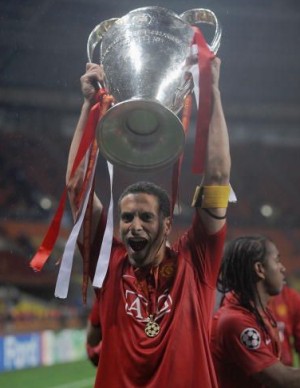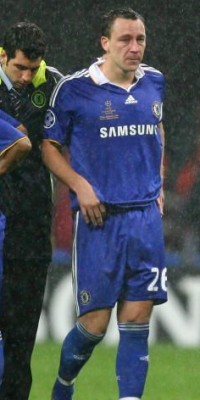|
Admittedly, Rio Ferdinand was waiting to get his hands on the European Cup, whilst John Terry knew he would have done so instead had he not sent his crucial kick onto the outside of the post and away. But nevertheless, given Ferdinand's level and serene approach to euphoria, it was reasonable to question whether he would have reacted to adversity in quite the same emotional fashion.
Terry, like his long term rival for the England captaincy, Steven Gerrard, is a leader of the clichéd, lion-hearted variety. He is domineering, brave, obviously passionate to the point of desperation. Those close to him depict him as a remorselessly driven professional who is harshly treated by tabloid tales which make him representative of the worst excesses of football culture. Nevertheless, he has styled himself as the leader and architect of the 'Chelsea Boys' culture which exists at Stamford Bridge both on and off the pitch.
Ferdinand is of course far from innocent on those latter charges; he too enjoys the bling, flash nightclubs and other trappings of the lifestyle, and has a questionable CV when it comes to his part-time role as an organiser of Christmas parties. But there is no question that Ferdinand has matured as a person and evolved into an imperious, unflappable defender and a fine leader of men in his own right - albeit one intriguingly different to Terry.
Ferdinand captains as he defends: with a considered, understated calm. When the tide turned against Manchester United in the second half of last week's encounter he continued to organise his team with a sure touch and to exude reassurance to those around him without resort to ranting and raving. Whilst Ferdinand's focus never left the match, Terry allowed himself to be drawn in to the needless extra-time confrontation with Carlos Tevez which achieved only the sending off of his star striker. Ferdinand's chief contribution to the same melee was to ensure Drogba could not confront Tevez again after his red card.
If Wednesday evening had been an audition for the England captaincy, then, it would have been settled in favour of Ferdinand long before his opposite number stepped up for his fateful kick. But the comparison is interesting not only at a personal level, but because it confronts perceptions of what, and who, makes a fine captain which have become deep rooted in English football.
|
That is an assumption predicated on little evidence; of the top four managers in the country this season, only Sir Alex Ferguson bears any resemblance to this stereotype, whilst Avram Grant, Wenger and Benitez are as far removed as it is possible to imagine. Meanwhile, the likes of Adams, Stuart Pearce and Terry Butcher have yet to enjoy great success as managers - yet the assumption continues to prevail.
The point is that captaincy, just like management, is an animal which can be skinned in a variety of ways. It can be practiced from the front, but that unbridled swashbuckling aggression - carrying as it does the risk of rash and soon-regretted actions - is not necessarily best. Indeed, in the highly charged atmosphere of a monumental occasion, the more calculating, considered approach may be a surer bet.
The essential quality which must be held by all who seek to lead is that magnetic element to which people instinctively gravitate. Whilst most sporting captains are big in stature, not all are easily heard; indeed, there are those who stand out in neither respect yet still possess that indefinable trait. And those that say less may well make more impact by choosing their few words carefully and for greater influence, especially if they are able to keep a clear head and offer direction in those vital moments when others are losing their composure.
It seems likely that Owen Coyle will search for a new captain for his revamped Burnley side for next season, with Steven Caldwell apparently an uncertain starter in the new order. He does not currently have any candidates who have both the stature and the vociferousness to satisfy that old stereotype. He would do well to remember the lesson of the Moscow face-off and resist the temptation to bring in a man just because he would offer that personality. It might be the making of Clarke Carlisle, it might tease twenty more annual appearances out of Alan Mahon, or it could reinvigorate Robbie Blake. It is a question of inner metal and not outward appearance.
Amongst other things, Rudyard Kipling once wrote that to be a man, you had to be able to "keep your head whilst all around you are losing theirs…meet triumph and disaster and treat those twin imposters just the same". It applies neatly to captaincy. Rio Ferdinand demonstrated, as ever any victor can, that he has those virtues. As John Terry, Chelsea captain, failed to hold himself together in the final stages of Wednesday's drama, we might reflect that appearances really can be deceptive until the seminal moment which reveals the truth, or otherwise, of that swaggering, confident, façade.


